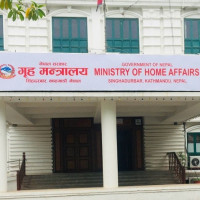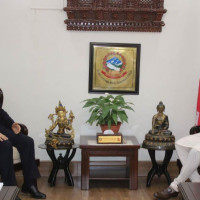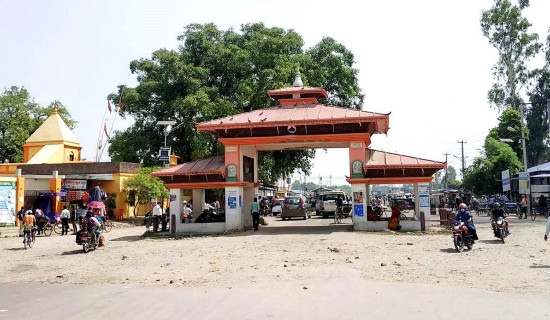- Thursday, 26 February 2026
Judicial Propriety Faces Procedural Risks
Two high court justices have reportedly come under harsh scrutiny. They are alleged to have overturned the district court decision on a high-profile political case in which a powerful politician from Rautahat district was convicted and was serving a long prison term. According to a newspaper report, the justices have been called back to the Judicial Council and stopped from hearing the cases registered in the court. An investigation is reportedly underway into their decision. Such incidents tend to reduce the judiciary to a constitutional entity shorn of legitimacy and trust in it.
In the history of the administration of justice, the judiciary had not faced the crisis of legitimacy on the scale that it has confronted these days. Almost three years back, the then chief justice Cholenda Shumshere Rana had been indicted, and the motion of impeachment had been registered against him in the parliament. The parliament's failure to treat the issue urgently deadlocked the impeachment proceeding. The motion was allowed to remain inconclusive without assignment of any reasons. A newly elected parliament has been working for the last two and a half years, but the incumbent parliament has not taken cognizance of the need to resolve it.
Miscarriage of justice
The then chief justice Rana had been accused of abetting corrupt practices and unscrupulous acts long entrenched in the judiciary. This did malign the image and prestige of the judiciary. Not only the bar, but even his fellow judges had deserted him and boycotted his judicial leadership – an unusual event in the annals of a judiciary of a democratic country. However, one needs to admit the fact that it is not just the judges dispensing justice in the court of law alone, but also the lawyers and law practitioners are blamed for the decline of the image of the judiciary and the miscarriage of justice.
Lawyers as collaborators aiding and assisting the process of justice dispensation are often alleged to maintain a convivial nexus with judges to broker unfair deals to engender the distortion of justice. It is also reported that lawyers strike shady deals with judges and operate as intermediaries, dealing a mortal blow to the standards and values of justice as if it were a commodity to be bought and sold in the market. The fact that the lawyers are also indulged intermediaries (Bichauliyas), among others, has been indicated in the reports of the panel headed by the Supreme Court justices constituted to reform the judicial system. The disclosure has confirmed the veracity of the fact.
Despite the constant deterioration in the performance of the judiciary these days, it must be noted that the Nepali judiciary has a glorious precedent in Nepal. It had held aloft the banner of justice high even when the country's polity was authoritarian and the constitution itself was less supportive of and friendly to judicial independence. Even during the time of Panchayat polity, the court had awarded landmark judgments.
The Supreme Court’s verdict during the partyless Panchayat on the defamation case, namely Sarbgya Ratna Tuladhar vs Rashtriya Panchayat (national legislature during the era), can be described as an important judicial verdict. The verdict delivered by a five-member full bench interpreted the Rastriya Panchayat as a body whose lawmaking authority was not absolute but subject to judicial review. This helped in providing succour to the concept of judicial competence and independence in Nepal. Moreover, later during the multiparty era, too, the Supreme Court made an important contribution in restoring constitutional democratic order in the country through judicial recourse.
When the former king Gyanendra took executive power from the elected Prime Minister and formed the Cabinet under his chairmanship, he neither followed the due process nor acted according to constitutional propriety. A royal commission was constituted in the name of inquiring into corrupt practices and abuses of authority by the members of the government, but, in fact, that was motivated by a political vendetta. Consequently, the then prime minister Sher Bahadur Deuba and many other senior leaders were imprisoned. The repercussions of the royal takeover were several and many.
The very limits of the constitutional monarchy were superseded. The parliament was already dissolved and civic freedoms were jeopardised. To check the abuse of authority, political leaders submitted a petition in the Supreme Court against the functioning of the royal commission. The court had a historic moment to accord its highest esteem and respect to the supremacy of constitutionalism. In its historic judgment, the court emphasised that the sovereignty of the country resided in the Nepali people, and hence they were the only source of the state power.
Royal commission
Since there already existed a constitutional body to investigate corruption and the abuse of authority, the Commission for the Investigation of Abuse of Authority (CIAA), the establishment of the royal commission was not warranted or justified. The judgment thus rejected all the premises of the royal takeover. The judicial decision was indeed a prelude to the road to the republican democratic order in Nepal. However, as highlighted at the outset, the respect and esteem that the judiciary commanded have now been significantly denuded. Needless to say, a well-functioning justice system is crucial to address the issues of the rule of law, constitutionalism, accountability and transparency effectively.
But corruption and perceptions of corruption in the judiciary have undermined the courts’ credibility. They have also impaired the accountability function that the judiciary is entrusted with in a democratic system – upholding citizens’ rights, securing the integrity of the political rules of the game, and sanctioning representatives of executive and legislative branches when they act in contravention of the law. It has become very urgent to restore the trust and credibility of the judiciary in Nepal, for which necessary reforms both in the composition of the Judicial Council and the appointment process of justices are needed.
(The author is presently associated with Policy Research Institute (PRI) as a senior research fellow. rijalmukti@gmail.com)















